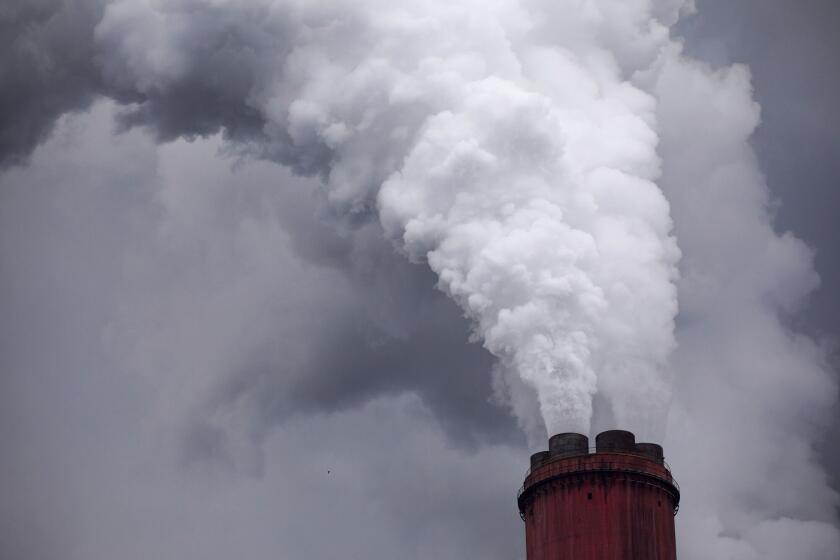
- Share via
- A California law adopted in 2016 mandated a gradual increase in the amount of organic waste that must be diverted away from landfills to sites where it could be treated and composted, thus reducing the emission of greenhouse gases.
- The Los Angeles area hasn’t invested in the infrastructure it needs to deal with the increased organic waste, nor is there the agricultural demand for the finished product that there is farther north.
Lancaster — A California law aimed at reducing the amount of climate-harming greenhouse gases at landfills is exacerbating the problem of illegal dumping in the Antelope Valley, according to local officials and residents.
The law, dubbed California’s Short-Lived Climate Pollutant Reduction Strategy, requires residents and businesses to separate food waste, yard trimmings and other organic waste from their trash to reduce the amount of methane, a powerful greenhouse gas, being emitted into the atmosphere.
Signed into law in 2016, the bill mandated a gradual increase in the amount of organic waste that must be diverted away from landfills to sites where the waste could be treated and composted, thus reducing the emission of greenhouse gases. The law required the diversion of 50% of all green and food waste from landfills by 2020; by 2025, that number was to hit 75%.
A separate law closed a legal loophole that had previously encouraged waste haulers to cover landfill debris with green waste.
Although experts say the law appears to be working in most regions of the state, the Los Angeles area has been a problem. They say the city of Los Angeles and many of its surrounding municipalities haven’t invested in the infrastructure needed to process increased organic waste, nor is there the agricultural demand for the finished product that there is farther north.
“Illegal dumping has been a problem in the Antelope Valley for decades,” said Chuck Bostwick, a senior field deputy for Los Angeles County Supervisor Kathryn Barger, who represents much of the area. “But, since these laws were passed, it’s gotten markedly worse.”
Bostwick said state regulations have made disposal of organic waste “much more expensive and hard to deal with,” and therefore increased the financial incentives for waste haulers to dump illegally, thus circumventing the high processing costs of composting and treating the material.

Antelope Valley residents say there are dozens or more rogue dump sites across the region. Although a few are just straight-up garbage and trash, most of the more than 80 identified by residents appear to be some form of unprocessed mulch.
One such site, located in San Bernardino County near the El Mirage Dry Lake bed, gave off a rancid smell on a cool spring afternoon. The material underfoot was dark brown and appeared to be a mix of wood chips and woody debris, dotted with cast-off rubber and plastic — the shred of a Spalding basketball here, a purple plastic squirrel there. The stumps of dead Joshua trees jutted from the fetid ground cover, while a few others, still alive, appeared anemic and were adorned in wispy strands of plastic debris and dust.
A lawsuit filed this year in U.S. District Court in Los Angeles by Antelope Valley residents claims that waste-hauling companies including Athens Services and California Waste Services are dumping hazardous substances without authorization, which the companies deny. Athens noted that the law encourages the distribution of compostable material to “farmers and other property owners for beneficial use.”
It’s this interpretation of land-application that has caused consternation among the valley’s desert-dwelling residents: There are no laws preventing landowners from applying compost to their fields or property.
According to Bostwick and others, landowners in the Antelope Valley are granting permission for waste haulers to come and dump on their property in return for payment.
That’s completely legitimate, according to Lance Klug, a spokesman for CalRecycle, the state’s waste agency. Property owners can spread waste on their land, he said as long as the material is compostable and not mixed with non-organic material; contains less than 0.5% of plastic, metal or other contaminants; contains only minimal amounts of metals and pathogens; and is not deposited in piles higher than 6 inches.
At sites such as the one near El Mirage, the legality of the material is questionable. A spreadsheet compiled by CalRecycle officials during a visit in November describes the waste as “illegal.” But at other sites, the waste appears to be in line with state regulations.
But even if it is legal, its presence threatens to cause lasting damage to the desert ecosystem, said Wesley Skelton, assistant land manager at the Portal Ridge Wildlife Preserve, a protected area near the Antelope Valley California Poppy Reserve.
Yard trimmings often contain seeds of invasive plant species and toxic herbicides, he said, and mulching is also problematic, disrupting fragile ecosystems, contributing to poor air quality and potentially the spread of the dust-loving fungus that causes Valley fever.
“We’re concerned that these landowners aren’t having to do any environmental impact report when they do dump on their land,” Skelton said. “The effects of these dumpings are long-lasting habitat destruction, and introduction of invasive plants that’s going to affect the air quality of Lancaster and Palmdale for years to come.”

“We put in a lot of effort to combat these plants— the Russian thistle and the mustard and all the different grasses and everything,” Skelton said, naming two invasive species that are crowding out the native flora. “It’s a huge problem.”
Nick Lapis, director of Californians Against Waste, doesn’t think the composting laws are the problem in the Antelope Valley. He said dumping has been happening there for more than decade — long before the composting laws were in place.

Irrespective of the cause, it is a big problem, he said, and state and local enforcement agencies need to stop it — both by requiring jurisdictions to track waste, at every step of its journey, and implementing a clear strategy for enforcement.
“It is outrageous that while some companies are investing millions in legitimate composting operations — real facilities with real customers and real climate benefits — others are just dumping raw green waste in the desert and calling it farming,” he said. “It’s a slap in the face to everyone doing the right thing.”









